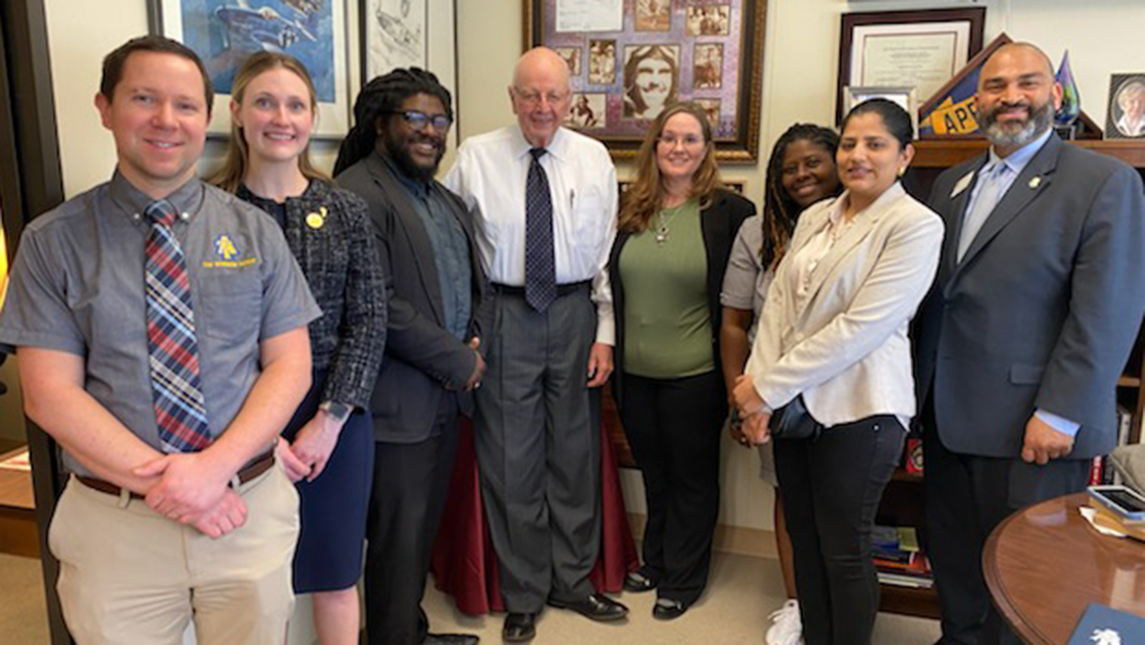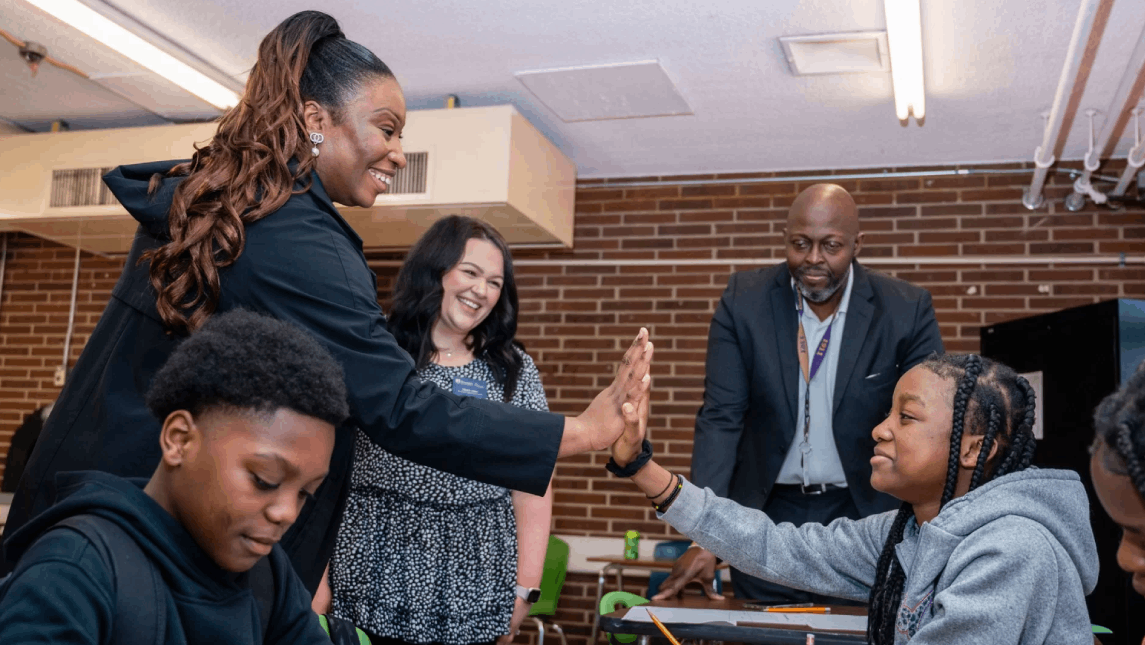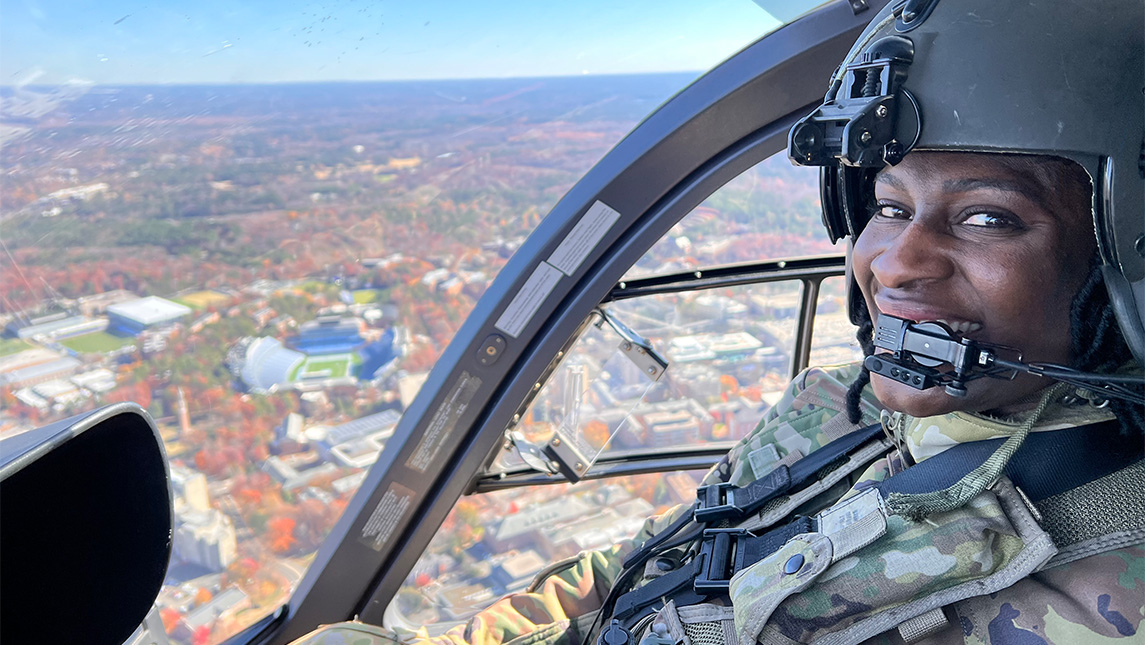Research that is having a direct impact on North Carolinians led to UNC Greensboro students Sarah Leck and Stacy Huff representing the university, and the School of Education’s Department of Information, Library, and Research Sciences, at the annual Graduate Education Day hosted by the North Carolina Council of Graduate Schools.
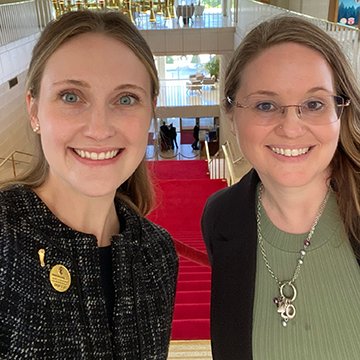
Graduate Education Day brings together graduate students, faculty, and administrators from across the state at the North Carolina General Assembly and provides students an opportunity to meet with legislators and explain the impact their research can make. It moves the idea of research being done on college campuses to the real world and shows the ways it can affect North Carolinians.
Leck graduated in May with her Master’s in Library and Information Science, while Huff, who earned a Master’s in Educational Assessment, Evaluation, and Research in 2022, is currently pursuing her Ph.D. in Educational Research Methodology.
Huff said, “The day was a whirlwind of meetings, ranging from quick door-to-door chats to meeting with Guilford County representatives in a large conference room in a joint session with N.C. A&T graduate students. This experience reinforced my belief in the power of graduate education to drive positive change. It was truly an honor to represent UNCG and the Graduate School at this event.”
Leck added, “I was so encouraged by the enthusiasm the legislators and their staff showed as (we) shared about our research projects and our experiences as graduate students and researchers at UNC Greensboro. It was really exciting to be able to meet and talk with them and for them to ask questions and show interest in our work.”
Leck’s Research Helping to Guide Library Renovations
As a neurodivergent student who would frequent Jackson Library, Leck would occasionally encounter a space that was not conducive to learning. The recent MLIS graduate used that experience to fuel her capstone project – researching the way that a library’s design can be improved to make study spaces more efficient for students like her.
Luckily for Leck, UNC Greensboro is about to begin a renovation to Jackson Library. Working with Michael Crumpton, Dean for University Libraries, on her research, Leck was able to connect with the designers and architects on the project to make recommendations on ways to improve the space for neurodivergent students. The renovations are providing Leck the ability to give a voice to neurodivergent learners.
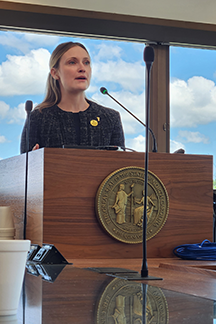
Leck said, “In these big renovation projects, it’s important for us to look at how we can serve all types of people and how we can serve the people that are often not served in those types of projects. It’s not just about including neurodivergent people. It’s not just about including disabled people. But if we’re designing for them, we’re designing for everyone.”
Neurodivergent students, those with ADHD or on the autism spectrum, often learn better in particular spaces and make up approximately 11% of students enrolling in college. Those needs may include a quiet room, a space where furniture can be moved, low-glare surfaces, or a sensory room. Even the library’s layout can impact these students.
While it is important for these students to have access to such spaces, it is also key that these spaces are adequately described online so that those who need to utilize them understand what is available for use.
Leck said, “The reason this all came up in the first place is because I went to Jackson Library to take an online class and I ended up in a study room that I think had the worst air circulation of any room I’ve ever been in. There were no blinds on the window, and it was August or early September. I thought I was going to pass out. But if I had known that there was not a lot of air circulation or that this room was likely to be hotter, I never would have booked this space.”
Her work has asked both students and staff about the specific information they are looking for when trying to reserve a room. Those findings can have an impact on the way spaces are described online, allowing users to “filter, or search, or find categories of spaces that are going to work for them.”
At the recent Graduate Showcase, Leck was able to present her research. Among those she spoke with were Provost Debbie Storrs, Director of State and External Affairs Andrew Cagle and Dean of the Graduate School Greg Bell.
The response Leck received was promising. “People seem really excited about what I’m doing, and they can see that it’s valuable even though they’re not in this specific field,” she said.
That led to Leck receiving her invitation to attend Graduate Education Day.
Leck said, “I feel like my first responsibility is to be an advocate for neurodivergent college students. And then I’m being an advocate for librarianship. To be able to go and have people be excited about the research that’s happening in the LIS field and to see that it’s worth investing in spaces that are accessible to neurodivergent people, is great.”
Huff’s Work With North Carolina Healthy Transitions Helping Improve Mental Health
As a graduate assistant working alongside Dr. Tiffany Tovey, Huff has worked closely with North Carolina Healthy Transitions. This program aims to improve access to treatment and support services for youth and young adults aged 16-25 who have serious mental health conditions and improve their functioning as they transition into adulthood. Currently focused on Henderson and Buncombe counties, NC Healthy Transitions plans to expand its services to other counties across the state.
Currently, as children with mental health issues age out of state-supported systems, many people fall through the cracks of not knowing how to access much-needed care.
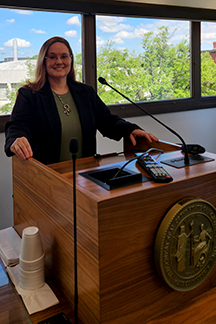
Huff said, “There’s not really a lot of support in navigating those systems. You’re talking about someone who has serious mental health issues to begin with. There are differences in support and differences in how it gets paid for. So, a lot of people really do just kind of stop trying. It’s harder for them to become independent adults who can hold a job or go to school. This project is working on creating new definitions at the state level as far as what kind of supports can be offered in those adult systems. They’re trying to work on creating an official peer support person who can help them navigate those changes.”
With a background in evaluation, Huff’s role with the program has been to help determine what the program is doing well and where improvements can be made. With surveys, one when clients first begin in the program and another when they discharge, she has provided essential feedback to NC Healthy Transitions staff.
“They loved the feedback, even when it was critical, because they took it as an opportunity to improve,” said Huff.
Many of the clients are children of migrants and Huff’s research showed that these clients were often having to not only work to improve their mental health, but also inform their parents about mental health.
Huff said, “Maybe culturally or linguistically, their parents just don’t understand. So, they’re in the position of having to explain to their parents what mental health is. Not only are they not getting that support, but they’re having to try to educate their parents.”
That led to the production of educational materials that can be shared directly with family members. Now the children “aren’t doing the heavy lift of trying to educate that generation.”
Part of what Huff assessed was the program’s community outreach and how they have educated the public about mental health. This led to her idea of a photovoice campaign that became a traveling exhibit.
Huff said, “We take people in that age group and have them take photos of their daily life of ‘What does mental health mean to you?’ Then we have them come together for a focus group, take their quotes about their pictures and pair them together, and print them out on enormous metal panels. Some of it was really impactful.”
This project provided information about the photos’ subjects and served as a tool to improve community awareness as it traveled the state. It informed the professionals that safe spaces were important to the children. They wanted “places where they could go and just be a kid with no expectations on them – there’s no homework, no job, just a place to be.”
Huff used the photovoice project in this year’s UNCG Graduate Showcase, winning in the Social Sciences, Education, and Business category. It was here that her work made its impression on Bell and led to her invitation to attend Graduate Education Day.
Students Show Real-World Impact
The work done by Leck and Huff is directly impacting people in North Carolina, and that was important to demonstrate during Graduate Education Day. Research is not something completed within a vacuum and, while they had limited time with legislators, this event allowed them to inform lawmakers about the work being done to improve the lives of others within the state.
These are only two among the countless research opportunities that graduate students at UNCG can look to tackle. Being able to share those stories with legislators makes them aware that real people are being helped by the research being done by graduate students.
Leck and Huff were able to meet with Senators Lisa Grafstein (District 13), Gladys A. Robinson (District 28), and Michael Garrett (District 27) along with Representatives Jerry “Alan” Branson (District 59), John Faircloth (District 62), and Tim Longest (District 34). They also had the opportunity to speak with a member from the office of Representative Pricey Harrison (District 61).
Huff said, “Everybody was really receptive… very engaged and intensely listening to what you were saying. Overall, we got the feeling that there actually is a lot of support for graduate education.”
